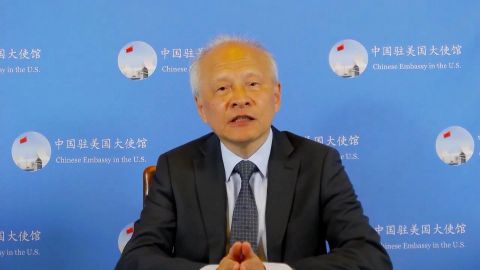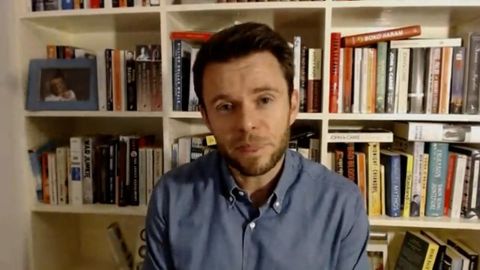Read Transcript EXPAND
CHRISTIANE AMANPOUR: And I guess — I mean, look, you know that there’s been all sorts of studies and reports done on what’s happening to the Uyghurs. The latest comprehensive state policy says, the government has mandated home stays, mass internment, mass birth prevention policy, forcible transfer of Uyghur children to state-run facilities, as we just saw, eradication of Uyghur identity, community and domestic life, selective targeting of intellectuals and community leaders. And, Ambassador, we’re not the only ones who are doing this reporting. So, what I don’t understand is, when you talk about international rules, genocide and the violation of people’s human rights based on ethnicity and identity and religion is against international rules. Why would a country as developed as China do that kind of thing? Why?
CUI TIANKAI, CHINESE AMBASSADOR TO U.S.: China is not doing these things. Let me make it very clear. China is not doing these things. And it’s very unfortunate. Some people, including some journalists, they start with very strong bias and prejudice. That’s their problem. That’s how they come to very different conclusions about particular situations, very much against real facts, what is really happening on the ground. I have been to Xinjiang more than once in recent years. And what I saw is a very different story, a very different picture from the reporting. Let me tell you the basic facts about Xinjiang. Until very recently, the big threat to Xinjiang, to people of all ethnic groups was terrorist attacks, thousands of them, hurting and killing thousands of innocent people, people from all ethnic groups. And it was a very serious threat. There was strong demand by the local people that the government had to do something to stop it. So, this has been our priority, to stop the spread of terrorist attacks. Some of them are connected with international groups like ISIS. It was a very serious threat to the lives and well-being of the people. And, secondly, there was mounting terrorist, extremist and violent ideology among the local population. And that was also very dangerous. But what we did was not to start a war there. We did not use missiles or drones. We set up efforts for education and training, help people to learn more about the law, to acquire good skills to improve their lives, find good jobs. And all this has made a huge difference.
About This Episode EXPAND
Chinese ambassador to the U.S. Cui Tiankai gives an exclusive interview on U.S.-China relations and Beijing’s treatment of the Uyghur population. “Bring Back Our Girls” author Joe Parkinson discusses Boko Haram’s 2014 kidnapping of nearly 300 Nigerian girls. I- MAK co-founder and executive director Priti Krishtel discusses vaccine nationalism and the problem with the United States’ patent system.
LEARN MORE


